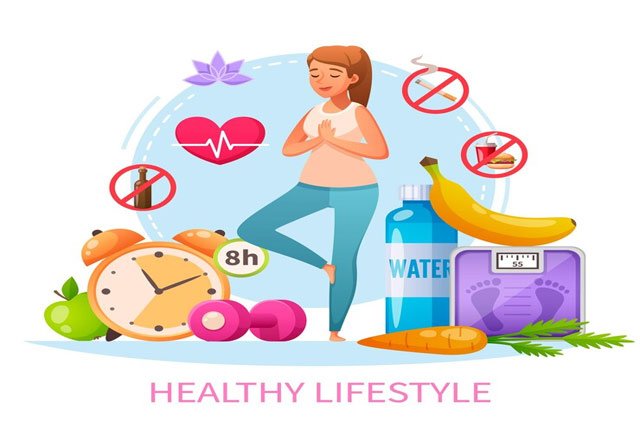
Wellness is a state of complete well-being. Finding balance in our lives is an ongoing, deeply personal process. Reflecting on your situation and understanding what might be out of sync is the first step toward an optimized state of wellness and joy. In this holistic guide to wellness, I’ll walk you through six simple steps that can help you foster a life of balance and joy.
The wellness concept is popular as many pursue a holistic guide to wellness and happiness. Balancing our overall well-being can be challenging, but the payoff of a harmonious life is priceless. Each step focuses on an area that, when enhanced, boosts overall wellness and aids in achieving a joyful, balanced life.
Step 1: Reduce Screen Time

It is highly beneficial to incorporate more breaks throughout the day to decrease the amount of time spent on screens and sitting down. By taking short breaks to move around and engage in activities, such as gentle stretching, brisk walking, or even doing quick and easy exercises like squats or lunges, you can effectively combat the adverse effects of prolonged sedentary behavior and promote overall well-being. Remember, even small movements and moments of activity can significantly affect you and how you feel. Additionally, incorporating these breaks can help reduce disruptions and improve and enhance focus, enhancing long periods of sitting or screen time. By prioritizing these brief moments of movement and activity, you can positively influence your overall well-being, directing you to a more balanced and energized lifestyle.
Step 2: Eating Habits

2.1. Balanced Diet
A balanced diet is crucial to your overall well-being. A diet rich in nutrients can help regulate your mood and energy levels. Strive for a well-balanced diet that includes all major food groups—fruits, vegetables, whole grains, lean proteins, and fats. Start by making small changes. Swap out soda for water, have a piece of fruit as a snack during the day, or add a serving of vegetables to every meal. Over time, these small changes will add to a more balanced diet.
2.2. Good Choices
When making good food choices, aim for whole, unprocessed foods. These are the foods that have the most nutrients and the fewest additives. When purchasing packed foods, read the labels carefully to know exactly what you eat. Avoid foods high in sugar, salt, and inappropriate fats, and aim for variety. The more diverse your diet, the more likely you will get all the nutrients you need. A balanced diet is a critical component of wellness and can significantly impact your overall wellness and happiness.
Step 3: Drink Water And Stay Hydrated

3.1. Benefits of Water
Hydration is essential for overall well-being. Every system of a human depends on water, so drinking enough each day is essential. Dehydration can lead to disruptions and a lack of concentration. The amount of water you need can depend on various factors, such as your size, activity level, and climate. A general rule of thumb is to drink around eight 8-ounce glasses of water daily but listen to yourself. If you’re thirsty, you’re already dehydrated.
Step 4: Find Ways To Manage Your Emotions

4.1. Importance of Understanding Your Emotions
Your emotions are necessary signals. They provide valuable information about what’s going on in your life, what’s important to you, and how you respond to things. Comprehending and handling your emotions is crucial to maintain your overall wellness. Learning to recognize and label your emotions is a good starting point. When you can pinpoint how you’re feeling, you can begin to take measures to manage those feelings.
4.2. Tips for Managing Your Emotional Feelings
There are many strategies for managing your emotions. Some involve changing your behavior—like taking a break if you’re feeling overwhelmed or removing yourself from a chaotic situation. Other methods include practicing relaxation techniques such as deep breathing and progressive muscle relaxation or yoga. Implementing this activity can also be a potent tool for managing feelings and emotional well-being. Find what works for you, and make it a routine to keep your emotions in check.
Step 5: Improve Your Work Management Techniques

5.1. Strategies for Effective Time Management
Our work impacts our wellness and can cause disruptions if not managed well. Effective time management is critical for balance. Set clear daily, weekly, and monthly goals. Use tools like calendars or lists to track tasks. Break tasks into smaller parts and prioritize by urgency and importance.
5.2. The Importance of Self-Care Practices
Self-care is vital in maintaining a good work-life balance. It means permitting yourself to care for your well-being and emotional needs. This can include taking a walk on your lunch break, setting boundaries with your time, or simply saying no to extra work when your plate is full. Taking care of yourself makes you better equipped to handle your other responsibilities, leading to a more balanced and fulfilling life.
Step 6: Social Connections And Support

6.1. The Role of Social Connections in Well-Being
Humans are social creatures, and social connections are necessary for our well-being and happiness. Social support can help you cope with disruptions, prevent loneliness, fuel your personal growth, and give you a sense of identity and belonging.
6.2. Ideas for Building and Maintaining a Strong Support System
Creating a solid support system is a lifelong effort. Reach out to friends and family often. Attend social gatherings, make new connections, and join activities like a book club or sports league for deeper connections and support.
Conclusion
The road to wellness is a personal one and can take many forms. You can make strides towards a more balanced and joyful life by following these simple steps. Remember, each step is just that—a step on the path, not an end. Keep moving forward, and be kind to yourself along the way. Your joy, happiness, and overall well-being are worth the effort. Embracing this journey as a holistic guide to wellness, encompassing mental, physical, and emotional aspects of health, can truly enrich your life.
FAQs
Why is reducing screen time important for overall wellness?
Reducing screen time helps combat sedentary behavior, improves focus, and enhances overall well-being by incorporating movement and activity into daily routines.
How can I improve my eating habits for a balanced diet?
Start by making small changes such as swapping soda for water, incorporating fruits and vegetables into meals, and choosing whole, unprocessed foods rich in nutrients. Gradually adopting these habits leads to a more balanced diet.
What are the benefits of staying hydrated and drinking enough water?
Staying hydrated is essential for overall well-being, as every system in the body depends on water. It helps maintain concentration, regulates mood, and supports bodily functions. A general guideline is around eight 8-ounce glasses of water daily.
Why is managing emotions important for wellness, and how can I do it?
Understanding and managing emotions is crucial for maintaining overall wellness. Strategies such as recognizing and labeling emotions, practicing relaxation techniques, and adjusting behavior help manage feelings effectively, leading to emotional well-being.








